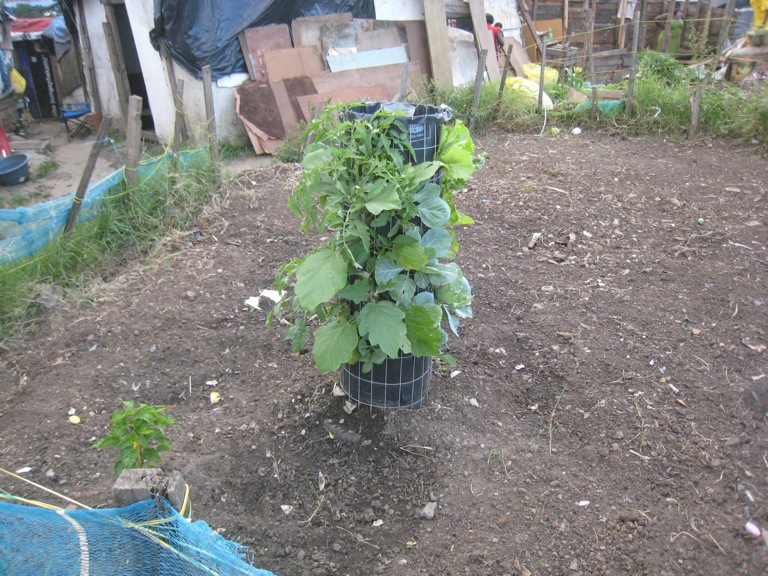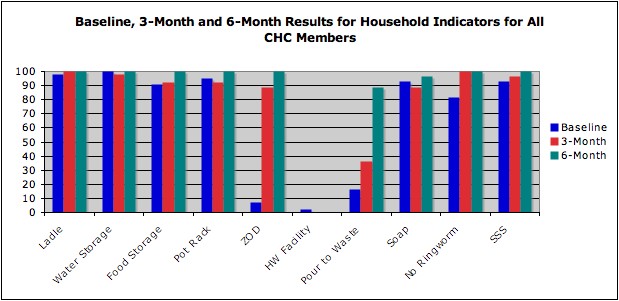March 2010
After 6 months of health promotion modules, impressive improvements have occurred at the Johanna Road Informal Settlement in the eThekwini Municipality, as measured by our Household Observations Survey, and as observed through communal changes and activities.
Research
From the baseline surveys, it was identified that the most problematic areas were low practice of zero open defecation (ZOD) (7%) and pour-to-waste method (16.3%), and a high presence of ringworm infection (18.6%). After 6 months of health promotion sessions, 100% of CHC member households have ZOD and no visible ringworm, while pour-to-waste method has increasd to 88.5% of CHC households. In addition to ZOD and no ringworm, 100% of CHC households now use a ladle, safely store their water and food, have a pot rack, and know how to make salt-sugar-solution to treat dehydration from diarrhea.
None of the CHC members have a handwashing facility, which Africa AHEAD believes is due to the majority of club members being located near a standpipe or ablution block. Therefore, they use these facilities to wash their hands, to limit the amount of grey water they need to dispose of near their house.
CHC Activities

Gardening
As documented in previous reports, the Johanna Road CHC communal and personal gardens have flourished. In recognition of the CHC’s talent and hard work, the eThekwini Department of Water provided 15 grey water agri-tube gardens designed by Khanyisa Projects to club members on 2 February, with seedlings delivered 3 March. Another round of approximately 20 agri-tubes will be delivered in the middle of March, to the remaining graduating club members. One or two “Coke Bottle” grey water gardens will also be piloted in the settlement to determine which system better fits the environment.
Projects
The CHCs have plans for a very exciting community wide project – a tyre-step pathway to link Boxwood Place to Johanna Road. As the settlement is located along the side of a steep hill, it can be very difficult and dangerous to traverse the settlement, especially in rainy weather. The tyre-step pathway will help to make this task easier, as the current dirt trail will be replaced with steps. Africa AHEAD has contacted companies to supply the tyres, and the DWS has agreed to provide tools (10 spades, 10 hoes, 10 forks, and 30 pairs of gloves) for the project. The CHC has communicated with the community leaders and other residents, as they envision this to be a community-wide project. They hope to commence work on the project second Saturday in March.
CHC members are also continuing to collect glass bottles as part of their new recycling project. Africa AHEAD has approached the Municipality about the possibility of organizing transport for CHC members to Pinetown in order for them to learn more first hand about recycling.
In recognition that only so much improvement can be made to the grey water and drainage issues with education, the DWS is rehabilitating the bottom ablution block. In addition to fixing the bottom ablution block, the DWS has agreed to put in a channeling system at the standpipe on Boxwood Place, so excess water from the tap can be diverted to the vegetable gardens located behind the standpipe. The DWS began the project 4 March, with plans to complete it by 10 March.
Graduation
In recognition of the completion of the health promotion sessions, a graduation for the CHC members successfully completing the modules, will be held 11 April at the Northern Water Treatment Works. The festivities will commence at 8h30 am, with a short walking tour through the settlement, where the new tyre-step pathway will be utilized.
Next Steps
As the CHCs have reached a point of transition. Africa AHEAD will assist Impiloyethu and Sakhimpiloyethu with their merge into one club. After this is complete, the club will elect an executive board, draft and ratify a constitution, register as a CBO, and open a bank account. Africa AHEAD plans to help the executive board ease into facilitation of the sessions so the transition goes smoothly. The CHCs have told Africa AHEAD that they plan to continue to meet on a regular basis to discuss community issues and to plan community activities. They have also expressed interest in Africa AHEAD’s module on nutrition.

